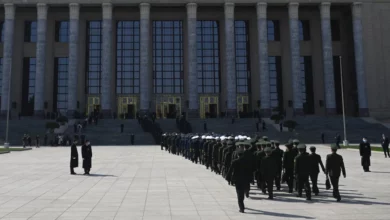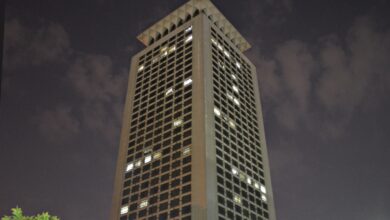“The army and the people were never one hand,” is the provocative title of a blogpost by Maikel Nabil, who is now incarcerated in a military prison cell. Nabil is one of a number of Egyptians who have written vividly about being detained by the military, and these narratives provide an unusual and disturbing view of an institution that at one time was viewed favorably by protesters.
Nabil was arrested on 4 February while he was on his way to join the demonstrations in Tahrir Square. At that time, the chant "The people and the army are one hand” was common amongst protesters, who saw soldiers take their side against the Mubarak regime' police forces. But this slogan proved to be short-lived for people like Nabil. “I’m writing … to let people know what will happen to them if this revolution fails," wrote Nabil on his personal blog. "Our revolution must protect us from such actions being repeated against people like you and me."
According to Nabil, he was arrested by a military police captain, who first took him to a downtown military detention center and then to a military intelligence unit in Nasr City.
“[The military captain] was insulting protesters along the way to our detention, and he beat me on the head several times,” wrote Nabil. “I spoke to around ten different army officers that night! I think they were recording by video camera ….They talked to me about why this revolution must end because the president has done everything that we asked.”
Nabil ended his testimony by saying, “My message to the protesters in Tahrir is don’t give up, you have to continue what you started. That square is the only pressure point we have, and we must not lose it. This revolution must be continued, because if it does not, then all of Egypt will get what I got and maybe more." On 14 December, Nabil was sentenced to two years in prison for insulting the armed forces and propagating false information about the military.
One of the most controversial issues is the connection between the military and the old regime. On 26 February, 15 days after Mubarak resigned, the army forcibly removed protestors from Tahrir and in front of the cabinet building. The following day, the Supreme Council of the Armed Forces (SCAF) apologized for this act on its Facebook page, but their anodyne statement stood in sharp contrast to the testimonies of those who had been detained.
“Each of us was specifically asked to say 'Long live Hosni Mubarak,' and those who refused got a fresh beating," wrote Mohamed Mousa on his blog, after being detained on 26 February. "It was clear to us that they believed they were dealing with people who had been paid to create a security threat.”
Less than half a month later, on 9 March, the military forcibly dispersed another sit-in. By this time, the rift was widening between revolutionaries and the SCAF, which had once prided itself as a protector of the movement.
Aly Sobhy, an actor who had participated in the protests since 25 January, was one of the demonstrators who was detained on 9 March. He has described suffering hours of torture inside the famed Egyptian Museum.
“The first thing I received was a head-butt from a soldier," wrote Sohby. "I told him, 'What's up, cousin, relax, what did I do?' (And, by the way, I call all soldiers ‘my cousin.') The soldier replied, 'You screwed up the country, you dirty sons of bitches!' So I said, 'Don’t worry man, everything will be fine.'”
“Then [the soldiers] dragged me by the hair, and an officer kept jumping up and down on top of me, and falling onto me, and getting up, and jumping again. I tried to move away, but then they stood me up and tied me by my hair from a horizontal pole — I don’t know where they got it from — and they kept hitting me in the knees and shins. I would start to fall to the ground but my hair would hold me up.”
“After some time of this torture my hair came loose. One soldier was holding a razor and hacking away at my hair, while another officer was doing his Kung Fu moves on me, while another soldier was hitting me with a wooden stick across my back, and another soldier electrocuted me.”
After that, Sobhy described the scene at the military prosecution headquarters C28, where he was transferred.
“It was like piles of meat had been thrown on the ground, and the soldiers of Egypt’s armed forces fell on top of them with all kinds of torture: electrocution, sticks, wooden staffs, electric cables, their boots," wrote Sobhy. "I was tossed on the pile, and every once in a while somebody else was thrown on top of me, so I end up getting beaten a little less — but of course they're much smarter than that."
“All the soldiers would say together: 'Raise your head high, boy, you’re Egyptian!' And as we raised our heads, they kicked us with their boots," Sobhy recalled. "That was the shock of a lifetime."
Sexual abuse was also inflicted upon those who were arrested by the army on 9 March. The most notorious case involved virginity tests performed on seven female detainees. Samara Ibrahim, 25, has described her harrowing experiences in detention.
“I was taken by a woman into a room with a large window and she asked me to take off all my clothes," Ibrahim wrote. "So I asked her to close the door and the window, but she refused. She called for someone who came and gave me an electric shock. So I had to obey, but I could see officers and soldiers laughing behind the window. They were joking with each other and laughing that they could see me almost naked.” Ibrahim continued: “On that day, I truly wished for death.”
But things got even worse: an officer in uniform examined the women to try to determine if they were virgins.
“He kept examining me for five whole minutes," said Ibrahim, breaking into tears at the memory. "This is humiliation: they were breaking our spirit so we wouldn't even think of asking for Egypt’s rights, so we wouldn't consider demonstrating against oppression.” Ibrahim was the only girl who dared to file a lawsuit against the army regarding the virginity tests.
Nevertheless, the army continued to commit violent acts against protestors during the following months, usually while forcibly evacuating the square. Detained activists said they sensed an undercurrent of vengeance on the part of soldiers and officers. Mohamed Effat, an activist who was briefly arrested by both army and police forces during a protest next to the Israeli Embassy in Giza on the anniversary of Palestinian Nakba on 15 May, also wrote about his experience.
“Police officers were beating and insulting us without any reason," wrote Effat. "An officer grabbed one guy and beat him while saying, 'Who do you think you are? Do you think you broke us down and now you can treat us arrogantly? Wake up you sons of bitches! You haven’t seen anything yet! We will show you hell!'"
One soldier used the word "infidel" while beating a Christian protestor. On 9 October, Maikel Mosad was killed when the military attacked a largely Coptic protest next to Maspero, the state TV building. Afterwards Vivian Magdy, Mosad's fiancée, broke into tears while describing the incident during a television interview.
“All of a sudden we saw a speeding APC zigzagging towards us, from the street onto the sidewalk," said Magdy. "The next thing I remember was the APC knocking [Mosad] off the ground. He was thrown onto the other side of the street, and his skull and leg were broken. His leg was almost separated from his body, and his head was bleeding. Then a group of military officers gathered around him and kept beating him while he was trying to breathe."
“One military officer beat me and insulted me," continued Magdy. "I threw my body over [my fiancé] and I was beaten with clubs on my back. He said, 'You infidel, what brought you here?' I said, 'Ok I am an infidel — but please call for an ambulance or my fiancé will die!' He replied, 'It’s none of my business,' and he left.”
Some protesters believed that non-Muslims and women were seen as having no rightful place in the movement. Activist Mona Seif was arrested briefly on 19 November, when the army evicted a sit-in at the Cabinet building. Seif, along with four old women, a young woman in her twenties, a child and a journalist, was held inside the cabinet building.
“A young military officer said to one of the old women, 'No decent women would be out at a time like this; we've been away since 2 AM,'" recounted Seif in a television interview. "She said to him, 'Please talk to me with respect — I'm your mother's age.' Then he ran at her and slapped her on the face repeatedly until at last she apologized."




